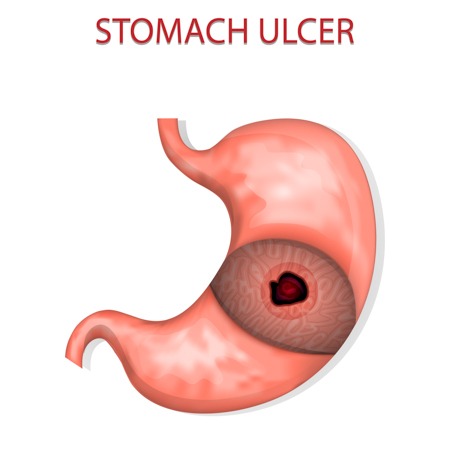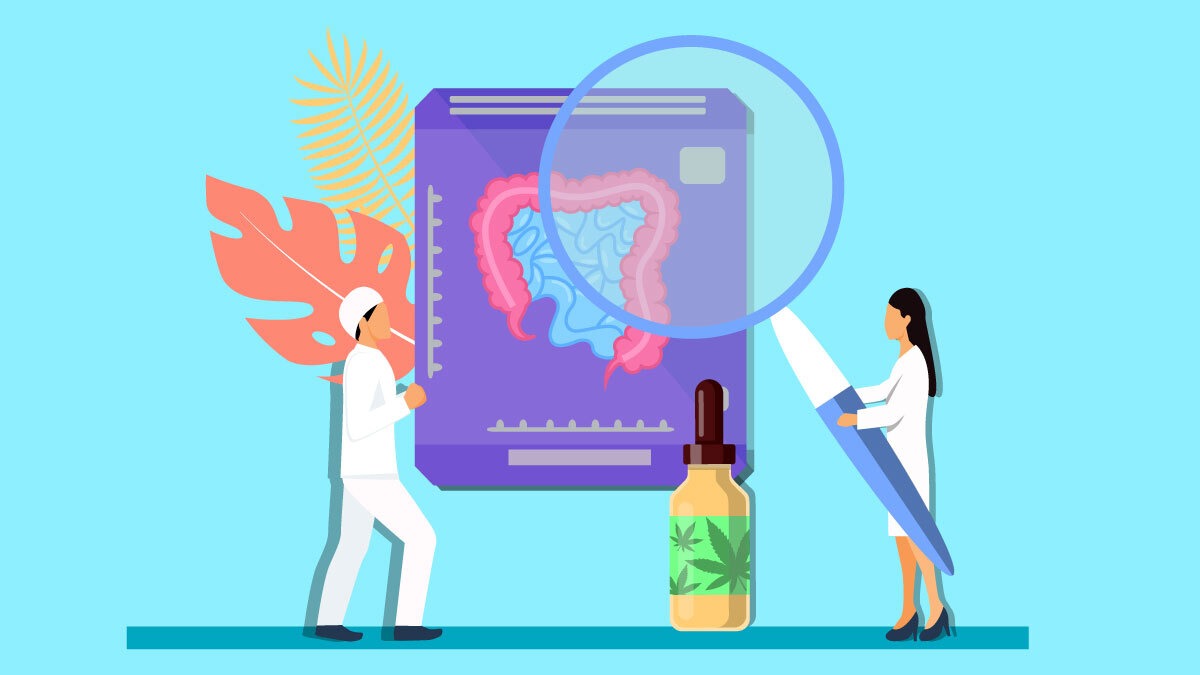People use CBD to treat a whole range of medical conditions, including stomach problems like ulcers.
The presence of cannabinoid receptors in the digestive system makes it clear that cannabis compounds like CBD can affect its performance. For example, we know that CBD can relieve nausea and pain on top of reducing inflammation.
All of the above properties can prove useful for stomach ulcers.
But what does science say about taking CBD oil for ulcers and other digestive issues?
Here’s everything you need to know.
How to Tell If You Have Stomach Ulcers

Stomach ulcers — also known as peptic or gastric ulcers — occur when the lining of the stomach gets severely damaged. They can also affect the esophagus as well as the duodenum, which is the upper part of the small intestine.
Stomach ulcers can appear at any age and are a common problem for the U.S. population. However, men are more likely to have it than women, especially if they’re close to their 60s.
Potential Causes of Stomach Ulcers
People develop stomach ulcers for a few different reasons.
One of the most common triggers is a bacteria known as helicobacter pylori or h.pylori in short.
When these bacteria spread across the stomach, they cause inflammation, which can eventually turn into ulcers. H.pylori contributes to 70–90% of stomach ulcers.
People who regularly take non-steroidal anti-inflammatory drugs (NSAIDs) are also at higher risk of developing gastric ulcers. Common NSAIDs include aspirin, diclofenac, ibuprofen, and naproxen.
People often take these medications to deal with problems like muscle and joint pain. However, when used frequently, they can result in the irritation of the stomach lining — leading to ulcers. It’s possible to decrease the risk by taking NSAIDs after a meal.
Despite limited evidence, some people believe that lifestyle factors such as stress and diet can also spur up the development of stomach ulcers. Things like spicy food, cigarettes, and alcohol can further irritate the stomach and deteriorate the condition.
Stomach Ulcers Symptoms
Abdominal pain is the most common symptom of stomach ulcers. Patients describe that feeling as a burning or gnawing sensation that typically occurs 2–3 hours after having a meal or at night. It usually begins in the central abdomen but can spread to the chest, back, or belly button.
Other symptoms of stomach ulcers include:
- Nausea
- Heartburn/GERD
- Loss of appetite
- Indigestion
- Weight loss
Untreated severe ulcers can cause internal bleeding. If any of the following symptoms occur, you should immediately seek medical attention:
- Sudden, severe pain that gets worse with time
- Bloody vomit
- Dark, sticky stools
How Are Stomach Ulcers Typically Treated?
Doctors usually recommend proton pump inhibitors (PPI) such as omeprazole and lansoprazole for treating stomach ulcers.
PPIs slow down acid production in the stomach, consequently reducing irritation. However, if someone has an h.pylori infection, they will need to add antibiotics to their PPI treatment.
Although the above medications may offer temporary relief from stomach ulcer symptoms, they will keep returning until the underlying problem is resolved. Moreover, since PPIs reduce acid production in the stomach, they can cause problems with digestion.
Does CBD Help Treat Stomach Ulcers?

CBD and other cannabis compounds have recently received much attention from medical researchers, especially when it comes to treating digestive issues. Many studies suggest CBD could help with conditions such as Crohn’s disease or colitis, both of which are inflammatory bowel diseases.
We also have some evidence that cannabinoids could help protect the stomach lining from damage, thus reducing the risk of developing ulcers.
The “why” behind the above effects lies in the relationship between plant-based cannabinoids and the human endocannabinoid system (ECS). (1)
The ECS is the major regulatory network in our bodies, with cannabinoid receptors (CB1 and CB2) appearing in every human organ system including the central nervous and the digestive systems.
The ECS also enables the active compounds in cannabis to exert their actions. For example, there is evidence that the signaling of CB1 receptors using cannabinoids blocks gastric acid secretion in humans and the experimental models of animals.
Studies have demonstrated that CBD can reduce the amount of gastric acid and increase blood flow to the stomach’s lining.
In a 2016 study published in Current Neuropharmacology, the authors found that the activation of CB1 receptors by cannabinoids can reduce both gastric motor activity and gastric acid secretion on top of decreasing the formation of lesions on the stomach lining (2).
In another study, the research team investigated the ability of cannabinoids to act on the gastrointestinal tract of some species, including mice, rats, guinea pigs, and humans (3).
Finally, a study from the Pharmacology Journal has found that THC inhibited ulcer formation in animal models, which are promising findings for those living in places where medical marijuana is legal. Such people can use both CBD and THC to amplify the effects of one another (4).
Although the above studies discussed cannabinoids in general — only mentioning CBD — the results are still promising. The authors believe that the endocannabinoid system may be deeply involved in the treatment of ulceration, inflammation, and gastric mucosal lesions.
CBD Oil for Stomach Ulcer Symptoms
In addition to potentially preventing and treating stomach ulcers, CBD could help with some of the stomach ulcer symptoms too.
Here’s what you need to know.
Pain
Many people turn to CBD oil for natural pain relief. Humans have been using cannabis for this reason for millennia; furthermore, a massive amount of research into CBD for pain provides clear results that this cannabinoid can address pain on several levels (5).
On top of helping with digestive pain, CBD oil could provide a safer option to NSAIDs for people who use them for migraines prevention or arthritis.
Nausea
Nausea often accompanies pain as the second most common stomach ulcer symptom. Research into CBD and nausea suggests CBD can act on the areas of the brain that control nausea and vomiting. However, CBD doesn’t do it directly. Instead, it signals the endocannabinoid system to regulate these functions (6).
Can CBD Worsen Stomach Ulcers?
There is anecdotal evidence coming from some CBD users that CBD oil can make you feel sick. However, gastrointestinal distress and upset stomach aren’t typically caused by CBD but rather by ingredients used to transport CBD oil into the body, or when something goes wrong during production.
Dr. Kenneth Brown, MD, a board-certified gastroenterologist and doctor of internal medicine in Plano, TX, says that it would be against CBD’s nature to “attack” the digestive system.
“It’s been shown [CBD] to help decrease acid reflux and heal ulcers,” he says. “In my practice, when someone has gastrointestinal issues with CBD, we start with the product, because many times that may be a reason they are feeling sick. Just like all other health supplements, the quality and the source of CBD oil make all the difference.”
Cannabis plants are bioaccumulators, meaning they draw both the good and bad substances from the soil. If hemp is grown in poor soil or undergoes aggressive extraction involving hydrocarbons, it will not only diminish the quality of the end product but it can also make it dangerous for your health.
Another potential reason why people may feel sick after taking CBD oil is the carrier it has been suspended in.
According to Michele Ross, Ph.D., CEO of Infused Health and a leading cannabinoid medicine researcher, “if you are experiencing gastrointestinal distress symptoms or an upset stomach, you may have a sensitivity, especially to coconut/MCT oil, which is the most common carrier I’ve seen. Many people can experience abdominal cramping and stomach pain, especially when consuming large quantities,” she said.
Does CBD Oil Have Side Effects?

Now that we’ve established stomach issues experienced by some CBD users are typically caused by the poor quality ingredients or production flaws, let’s discuss other potential side effects of CBD.
Several health organizations, including the World Health Organization (WHO), have acknowledged CBD as having a remarkable safety profile. This 2017 study showed that CBD was well-tolerated by humans in daily doses of up to 1,500 mg.
That being said, there are a few mild side effects you should be aware of.
For example, CBD can cause a dry mouth feeling due to its interaction with the salivary glands in the mouth. In simple terms, CBD and other cannabinoids can inhibit saliva production, resulting in increased thirst.
Another potential side effect — when you take high doses of CBD — is a temporary drop in the blood pressure that can make you feel dizzy and sleepy. While this may be the desired effect among those who take CBD oil for insomnia, some people may feel tired after taking high doses in the morning. If you don’t want to feel sleepy after taking CBD oil, use lower doses to boost focus and productivity while still receiving a gentle calming effect.
There’s also the risk of potential CBD-drug interactions. CBD is known to interact with many medications because it inhibits the system of enzymes that breaks them down in the liver — resulting in subtherapeutic effects or, on the contrary, in toxicity. Always make sure to consult your doctor before buying CBD oil if you take any prescription medication for stomach ulcers.
CBD Dosage for Stomach Ulcers
Every person has unique body chemistry, different metabolism rate, weight, and severity of symptoms, so what works for you may not necessarily work for your neighbor, even though you share the same condition.
Given this, finding the right dose of CBD for your stomach ulcer problems is an experimental process. The best way to go about finding the amount that works for you is to take 1–6 mg of CBD for every 10 pounds of your body weight. Continue to take this dose for 3–7 days, monitoring how CBD affects your painful symptoms.
While you may not see the direct effects on your stomach lining, you can certainly experience relief from nausea, pain, or inflammation.
If the initial dosage fails to ease your symptoms, you can increase the dosage by 5 mg until you find a dose that works.
Final Thoughts: Should You Take CBD Oil for Stomach Ulcers?
While no study has yet investigated the efficacy of CBD as the only treatment for stomach ulcers, several animal and human studies have pointed to cannabinoids as potential relievers of many digestive problems.
CBD is a potent anti-inflammatory; it can also affect pain by blocking its signals, not to mention the relief from nausea and improved appetite. Even though the scientific evidence is fresh, you can use CBD oil as an adjunctive treatment for your stomach ulcers.
Make sure to stay vigilant against poor-quality products that are churned out by some companies to capitalize on the booming market. Quality issues with CBD oils can result in an upset stomach and even worsen your ulcers. Always seek out reputable companies that use organically grown hemp and test their products in third-party laboratories for potency and purity.
Do you take CBD oil for stomach ulcers? Or does it help you with other digestive problems? Let us know in the comments below, we’d like to hear your thoughts!
References:
- Abdel-Salam, Omar. “Gastric acid inhibitory and gastric protective effects of Cannabis and cannabinoids.” Asian Pacific journal of tropical medicine vol. 9,5 (2016): 413-9. doi:10.1016/j.apjtm.2016.04.021
- Gyries, K. and Zadori, Z.S. “Role of Cannabinoids in Gastrointestinal Mucosal Defence and Inflammation.” Current Neuropharmacology vol. 14,8 (2016): 935–951.
- Pertwee, R G. “Cannabinoids and the gastrointestinal tract.” Gut vol. 48,6 (2001): 859-67. doi:10.1136/gut.48.6.859
- Sofia, R D et al. “Evaluation of antiulcer activity of delta9-tetrahydrocannabinol in the Shay rat test.” Pharmacology vol. 17,3 (1978): 173-7. doi:10.1159/000136851
- Grinspoon, P. (2019, Aug 27). Cannabidiol (CBD) — what we know and what we don’t. Retrieved from https://www.health.harvard.edu/blog/cannabidiol-cbd-what-we-know-and-what-we-dont-2018082414476.
- ECHO. (2017, Feb 17). Nausea: Cannabinoids and CBD Research Overview. Retrieved from https://echoconnection.org/nausea-medical-cannabis-and-cbd-research-overview/.

